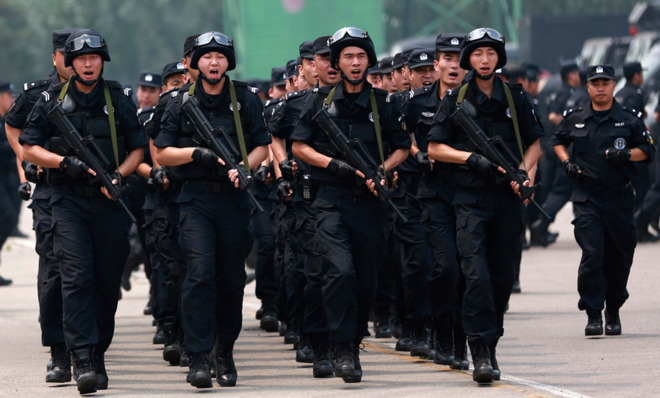What is behind China's new belligerence?
So much for a peaceful rise...

A free daily email with the biggest news stories of the day – and the best features from TheWeek.com
You are now subscribed
Your newsletter sign-up was successful
In the past nine months, the People's Republic of China has been on a bender. It has picked fights and barged into territory claimed by Japan, Vietnam, and the Philippines, using planes, ships, even an oil rig, to bully its neighbors.
For the last two decades, China's neighbors have nervously looked on and wondered if a strong economy and increased military spending might create a China more willing to use force to solve territorial disputes. Those fears seemed to have been unfounded, as China turned out to be a relatively benign neighbor.
In 2010, all of that started to change. A dispute with Japan over a Chinese fisherman arrested for fishing in territory claimed by both countries quickly turned ugly, with widespread anti-Japanese protests throughout China. The protests were deeply nationalist in nature with evidence of tacit approval of the Chinese government.
The Week
Escape your echo chamber. Get the facts behind the news, plus analysis from multiple perspectives.

Sign up for The Week's Free Newsletters
From our morning news briefing to a weekly Good News Newsletter, get the best of The Week delivered directly to your inbox.
From our morning news briefing to a weekly Good News Newsletter, get the best of The Week delivered directly to your inbox.
In late November 2013, China declared an Air Defense Identification Zone over the East China Sea, including territory claimed by Japan. In March 2014 the Chinese Coast Guard established a blockade of the Second Thomas Shoal, which China claims, preventing the resupply of Filipino marines manning an outpost. Finally in May, China moved the HD-981 oil rig into territory Vietnam claims as its Exclusive Economic Zone.
The China of 2014 is aggressive, even arrogant — a bewildering turn from the friendly, confident nation that hosted the 2008 Beijing Olympics. Somewhere in China's political structure, someone has decided on a course of intimidation instead of cooperation. Why?
One explanation is that Beijing's new combativeness is internally motivated. China's internal power centers, particularly the Communist Party and the People's Liberation Army, are badly factionalized. Xi Jinping, China's new leader, needs to get the hawkish Chinese military behind him to consolidate his hold on power. Doing so, the theory goes, requires Xi to let China's hawks have their way. Implicit in this argument is that at some point, Xi will rein them in.
Another explanation is that it's all part of a long-term plan to push the United States out of East Asia and the western Pacific. Constant pressure against countries such as the Philippines, Vietnam, and Japan will cause them to eventually cave in, abandon relations with the United States, and essentially accept a China-dominated Asia.
A free daily email with the biggest news stories of the day – and the best features from TheWeek.com
Yet another theory holds that China has simply decided it needs these disputed territories — all of which have substantial reserves of oil and natural gas — and is willing to strong arm other countries to get them. China believes it is now economically and militarily strong enough to withstand the subsequent international backlash. After all, China's economy is heavily integrated into the global economy — sanction China for its misdeeds and the rest of the world suffers.
Indeed, in each case of aggression, China has announced that there is nothing to negotiate. The disputed territories are Chinese territories, and it will refuse all attempts at mediation, even by an international court of arbitration.
That's not how modern diplomacy is supposed to work. It's a hard line that leaves room for very few options; the other country involved in the dispute can only acquiesce or resort to force.
Of course, China's opaque political culture means nobody really knows why China has changed. Nobody knows when the Chinese government will stop — if it intends to stop at all.
One thing's for sure: China has squandered decades of neighborly goodwill in just a few short years. After the aggressive, nationalistic bender of the last four years, it will be difficult to win back the trust of many of its neighbors. Hopefully, in the mindset of China's leadership, on some level that still matters.
Kyle Mizokami is a freelance writer whose work has appeared in The Daily Beast, TheAtlantic.com, The Diplomat, and The National Interest. He lives in San Francisco.
-
 Health insurance: Premiums soar as ACA subsidies end
Health insurance: Premiums soar as ACA subsidies endFeature 1.4 million people have dropped coverage
-
 Anthropic: AI triggers the ‘SaaSpocalypse’
Anthropic: AI triggers the ‘SaaSpocalypse’Feature A grim reaper for software services?
-
 NIH director Bhattacharya tapped as acting CDC head
NIH director Bhattacharya tapped as acting CDC headSpeed Read Jay Bhattacharya, a critic of the CDC’s Covid-19 response, will now lead the Centers for Disease Control and Prevention